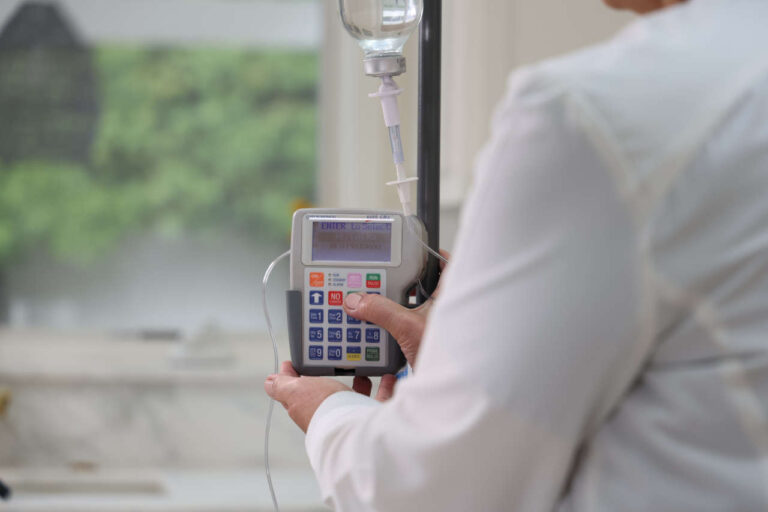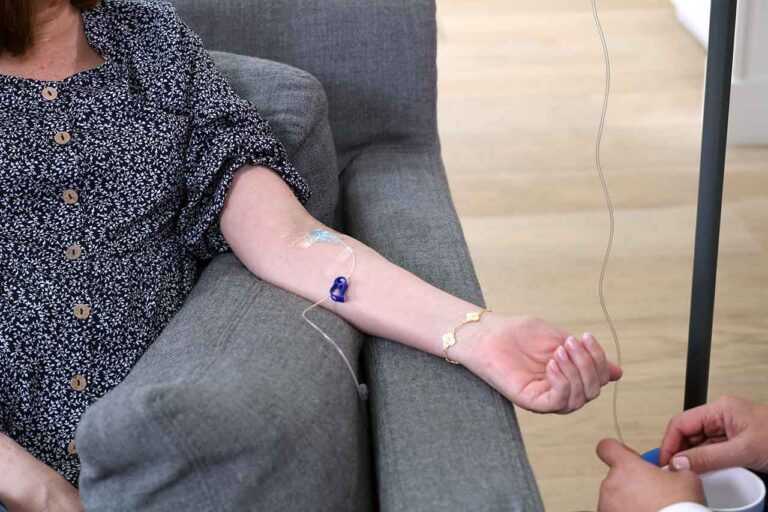
If you or a loved one have been diagnosed with multifocal motor neuropathy (MMN), your healthcare provider is most likely to recommend a treatment option called intravenous immunoglobulin (IVIG) therapy. Multifocal motor neuropathy, or MMN, is a rare and slowly progressive neurological disorder that affects the peripheral nerves in your body, specifically motor nerves that control the muscles. Due to motor nerve damage, you may experience muscle weakness, especially in your arms and hands, and have difficulty with movement.
Get IVIG Prior Authorization
Although there is no cure for MMN yet, IVIG therapy is preferred as a first-line treatment option due to its benefits in improving motor function in most patients with MMN.
This article provides a comprehensive guide to better understand what MMN is, and how IVIG treatment works.
What Is Multifocal Motor Neuropathy (MMN)?
Multifocal Motor Neuropathy is a chronic, progressive, and relapsing disorder characterized by muscle weakness that usually affects different body parts asymmetrically (unevenly). For example, you may experience weakness in your arms and hands more than in your legs. Over time, it becomes more difficult to do things like dressing, gripping objects, writing, or performing tasks that require fine motor skills.
This neurological disorder is more prevalent in men than women and typically progresses slowly. Patients may notice their first symptoms in their 40s or 50s.
Though the exact cause of MMN remains unclear, it is thought to be caused by the body’s immune system mistakenly attacking the nerves. This autoimmune response damages the nerve’s protective covering, known as the myelin sheath, which leads to impaired nerve function.
IVIG as a First-line Treatment for MMN
Intravenous immunoglobulin (IVIG) is used as a first-line treatment option for many patients to manage the symptoms of MMN and improve their quality of life. With IVIG therapy, a solution containing concentrated antibodies from healthy donors is infused into the patient’s bloodstream. These antibodies act as a replacement for the patient’s own immune system, helping to suppress the autoimmune response responsible for damaging the nerves in MMN.
Multiple randomized clinical trials have proven the effectiveness of IVIG treatment for MMN so far.
How IVIG Treatment Works
A patient with MMN receives an immunoglobulin (IgG) solution through a thin tube (catheter) inserted into their vein during IVIG treatment. The IV infusion process usually takes several hours and can be conducted in an outpatient setting or at home, depending on the patient’s condition and preferences.
The antibodies present in the IVIG solution act as decoys, diverting the autoimmune response away from the nerves. This helps reduce inflammation and prevent further damage to the myelin sheaths. As a result, the patient experiences an improvement in muscle strength, and disease progression is significantly slowed.
Standard IVIG Dosage for MMN Condition
The standard dose of IVIG is 0.4 g/kg, which is given over 5 consecutive days, with a total of 2 g/kg. However, Some clinicians prefer a 2-day dose at 1 g/kg every day.
Depending on the patient’s health, the follow-up maintenance dose for IVIG infusions could range from 0.4 g/kg once a week to 2 g/kg every 8 weeks.
Get IVIG Copay Assistance
IVIG Financial AssistanceHow IVIG Improves MMN Condition

IVIG treatment is effective in improving the condition of MMN in several ways:
Promoting Muscle Strength
One of the primary goals of IVIG in MMN is to improve muscle strength, particularly in the hands and arms. As the immune response is modulated and inflammation decreases, the muscles receive better nerve signals which results in enhanced muscle function.
Many patients have reported increased muscle function and better grip strength after undergoing IVIG therapy. In one study, five patients who received IVIG at a dose of 0.4 g/kg for 5 days showed improved strength compared to those who received a placebo after 28 days.
Similarly, based on four randomized clinical trials, it was found that 78% of patients who received IVIG therapy experienced a significant improvement in muscle strength. In comparison, only 4% of patients who received a placebo showed improvement. These trials demonstrate the effectiveness of IVIG treatment in improving muscle strength and disability in MMN patients.
Slowing Disease Progression
MMN is a chronic condition, and the progression of the disease can lead to increased muscle weakness and disability over time. IVIG treatment has been shown to slow down the progression of MMN by preventing further nerve damage. This preservation of nerve function helps maintain muscle strength and function, allowing individuals with MMN to maintain a higher quality of life.
Reducing Relapse Frequency
MMN is characterized by periods of relapses, where symptoms worsen temporarily. IVIG treatment has been found to reduce the frequency and severity of these relapses. IVIG therapy can help minimize the impact of relapses and maintain more stable muscle function by providing a stable and consistent immune response.
Enhancing Quality of Life
With improved muscle strength and reduced symptoms, patients often experience an enhanced quality of life. This enables them to engage in daily activities with greater ease.
The response to IVIG treatment can vary from person to person. Some individuals may experience significant improvement in symptoms, while others may have more modest benefits. Sometimes, it may take several weeks or even months of treatment to observe the full effects.
Potential Side Effects and Precautions
While IVIG treatment is generally safe, it also has some potential side effects. MMN patients may experience mild headaches, fatigue, fever, and muscle aches. These side effects are usually temporary and subside within a few days after treatment.
More serious side effects such as allergic reactions, kidney problems, or blood clotting disorders may occur in rare cases. It is essential to discuss any concerns or potential risk factors with your healthcare provider before starting IVIG treatment.
Get Your IVIG Dose
At-Home InfusionThe Treatment Process and What to Expect
If the healthcare provider determines that IVIG is an appropriate treatment option for your MMN, they will work with you to develop an individualized treatment plan. This plan will include details about the dosage, frequency, and duration of the IVIG infusions.
During the treatment process, you may need to visit a clinic or receive infusions at home. The medical staff will monitor your vital signs and response to treatment to ensure its efficacy and safety.
It is important to note that IVIG treatment for MMN is typically long-term, often spanning months or even years. Therefore, regular follow-up appointments with your healthcare provider are necessary to assess your progress and make any needed adjustments to the treatment plan.
Conclusion
IVIG treatment has emerged as a highly effective therapy for managing multifocal motor neuropathy (MMN). By modulating the immune response and reducing inflammation, IVIG can help improve muscle strength, slow disease progression, and enhance the quality of life for MMN patients.
So, if you or a loved one is living with MMN, it is crucial to consult with a healthcare professional experienced in treating this condition. The right physician will provide a comprehensive evaluation and guide you through the treatment options including IVIG therapy and its potential benefits and risks. With the right treatment and support, many MMN patients can lead fulfilling lives despite the challenges posed by the condition.
REFERENCES:
- Léger, M. (2014). Immunoglobulin (Ig) in multifocal motor neuropathy (MMN): Update on evidence for Ig treatment in MMN. Clinical and Experimental Immunology, 178(Suppl 1), 42-44. https://doi.org/10.1111/cei.12505
- Gentile, L., Russo, M., Rodolico, C., Arimatea, I., Vita, G., Toscano, A., & Mazzeo, A. (2021). Long-term treatment with subcutaneous immunoglobulin in multifocal motor neuropathy. Scientific Reports, 11(1), 1-7. https://doi.org/10.1038/s41598-021-88711-9
- Noyce, A. J., Eftimov, F., Van Den Berg, L. H., Brassington, R., De Haan, R. J., & Van Schaik, I. N. (2022b). Immunoglobulin for multifocal motor neuropathy. Cochrane Database of Systematic Reviews, 2022(1). https://doi.org/10.1002/14651858.cd004429.pub3
- Liguori, N. F., Rojas, J. I., Klajn, D. S., & Ciapponi, A. (2018). Intravenous immunoglobulin to prevent relapses during pregnancy and postpartum in multiple sclerosis. The Cochrane Database of Systematic Reviews, 2018(9). https://doi.org/10.1002/14651858.CD010601.pub2
- Kuwabara, S., Misawa, S., Mori, M., Iwai, Y., Ochi, K., Suzuki, H., Nodera, H., Tamaoka, A., Iijima, M., Toda, T., Yoshikawa, H., Kanda, T., Sakamoto, K., Kusunoki, S., Sobue, G., Kaji, R., & Study Group, I. M. (2018). Intravenous immunoglobulin for maintenance treatment of multifocal motor neuropathy: A multi‐center, open‐label, 52‐week phase 3 trial. Journal of the Peripheral Nervous System, 23(2), 115-119. https://doi.org/10.1111/jns.12268
- Hameed, S. (2022, July 4). Multifocal Motor Neuropathy. StatPearls – NCBI Bookshelf. https://www.ncbi.nlm.nih.gov/books/NBK554524/
- Van Den Berg, L. H. (2012). The Long-term Treatment of Multifocal Motor Neuropathy with Intravenous Immunoglobulin. European Neurological Review, 7(2), 128. https://doi.org/10.17925/enr.2012.07.02.128
- Kumar, A., Patwa, H. S., & Nowak, R. J. (2017). Immunoglobulin therapy in the treatment of multifocal motor neuropathy. Journal of the Neurological Sciences, 375, 190-197. https://doi.org/10.1016/j.jns.2017.01.061
- Terenghi, F., Cappellari, A., Worrall, B. B., Carpo, M., Barbieri, S., & Nobile-Orazio, E. (2004). How long is IVIg effective in multifocal motor neuropathy? Neurology, 62(4), 666–668. https://doi.org/10.1212/01.wnl.0000110185.23464.a1
- Van Schaik, I. N., Van Den Berg, L. H., De Haan, R. J., & Vermeulen, M. (2005). Intravenous immunoglobulin for multifocal motor neuropathy. Cochrane Database of Systematic Reviews. https://doi.org/10.1002/14651858.cd004429.pub2
- Stangel, M., Gold, R., Pittrow, D., Baumann, U., Borte, M., Fasshauer, M., Hensel, M., Huscher, D., Reiser, M., & Sommer, C. (2016). Treatment of patients with multifocal motor neuropathy with immunoglobulins in clinical practice: The SIGNS registry. Therapeutic Advances in Neurological Disorders. https://doi.org/10.1177/1756285616629869













